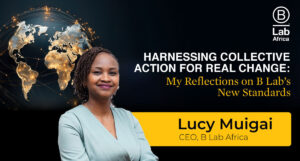By Lucy Muigai, CEO of B Lab Africa
As leaders and communities across the globe grapple with urgent climate and social justice challenges, there is a growing recognition that business must step up, not in rhetoric, but in action. At B Lab Africa, we are proud to stand at the forefront of this transformation with the release of B Lab’s newly launched B Corp Certification standards. These represent the most comprehensive and ambitious evolution of our standards to date.
The new standards, now in their seventh iteration, build on the global success of the B Corp movement. They are designed to help businesses scale their positive impact in alignment with shared social and environmental goals. With nearly 10,000 B Corps operating in over 100 countries and across 160 industries, employing close to 1 million workers, the momentum is unmistakable. The B Corp movement is no longer a niche initiative; it is a global shift in how we define responsible business.
In Africa, this shift could not be more relevant. Our continent is rich in entrepreneurship, natural capital, and cultural resilience. But we are also disproportionately affected by the global challenges these standards seek to address. From climate vulnerability to inequality and economic disparity, African businesses must now lead with greater accountability and purpose.
That is why this moment is so powerful. For the first time, all B Corps globally will be required to meet performance expectations across seven clearly defined impact topics. This change marks a departure from the traditional cumulative points approach, creating a more transparent and holistic framework for what it truly means to be a B Corp.
Let me take a moment to reflect on these seven key areas:
- Purpose and Stakeholder Governance: Businesses must have a defined purpose and embed governance that serves all stakeholders, not just shareholders. Such an approach will challenge businesses to rethink leadership and structure in ways that truly reflect societal needs.
- Climate Action: An urgent priority. Companies must now actively plan to limit global warming to 1.5 degrees Celsius, and larger organisations are expected to adopt science-based emission targets. For many African countries already dealing with climate shocks, such an initiative is both essential and long overdue.
- Human Rights: Businesses will need to evaluate their supply chains and operations to ensure they are not complicit in violations. For Africa, where informal labour and complex value chains are common, such an assessment will help create fairer, safer working conditions.
- Fair Work: Good jobs and fair workplaces are non-negotiable. The standards call for fair wages, a healthy workplace culture, and active engagement with employees. The issue is particularly relevant in Africa’s youthful labour market, where the quality of work matters as much as job creation.
- Environmental Stewardship and Circularity: Companies must act on their environmental impacts. With Africa’s natural ecosystems under increasing pressure, businesses will need to operate in ways that protect, rather than deplete, our resources.
- Justice, Equity, Diversity and Inclusion: The standards encourage diversity and equity not just within organisations but also in the communities they serve. Such diversity is essential for building inclusive African economies that leave no one behind.
- Government Affairs and Collective Action: The private sector cannot work in silos. These standards promote responsible lobbying and encourage businesses to participate in advocacy that benefits people and the planet. For large businesses, the procedure includes publishing country-by-country tax reports to ensure transparency.
For African businesses, these seven themes offer both a challenge and an opportunity. A challenge, because they demand deep reflection and transformation. But an opportunity, because they create a framework for African enterprises to lead in creating inclusive, resilient, and sustainable economies.
Importantly, these standards do not exist in a vacuum. They have been shaped through a robust, multi year consultation involving over 26,000 pieces of feedback from stakeholders around the world. They are designed to align with existing frameworks such as GRI, the Science Based Targets initiative, and Fairtrade. This means that businesses do not have to start from scratch. They can build on what they already know and focus on what truly matters: delivering impact for all stakeholders.
In my view, what makes this new framework especially powerful is the focus on continuous improvement. B Corps are now required to demonstrate impact progress over time, with specific milestones after three and five years. This helps prevent stagnation and ensures that certification is not simply a one-time achievement, but a continued effort and commitment to better business.
This evolution is not just technical; it is philosophical. It tells us that purpose-driven business is not a trend, but a necessity. In a time when many are retreating from climate and social justice initiatives, the B Corp community is moving forward with greater clarity and ambition.
For our continent, this presents an opportunity to lead from the front. We have the opportunity to reshape the image of African business and demonstrate that growth, resilience, and purpose are not incompatible with each other; rather, they represent the future.
To every business in Africa looking to scale with integrity, this is your moment.
Want to discuss more? Let’s connect!
Email me at lucy@b-labafrica.net to get your business on the B map.





